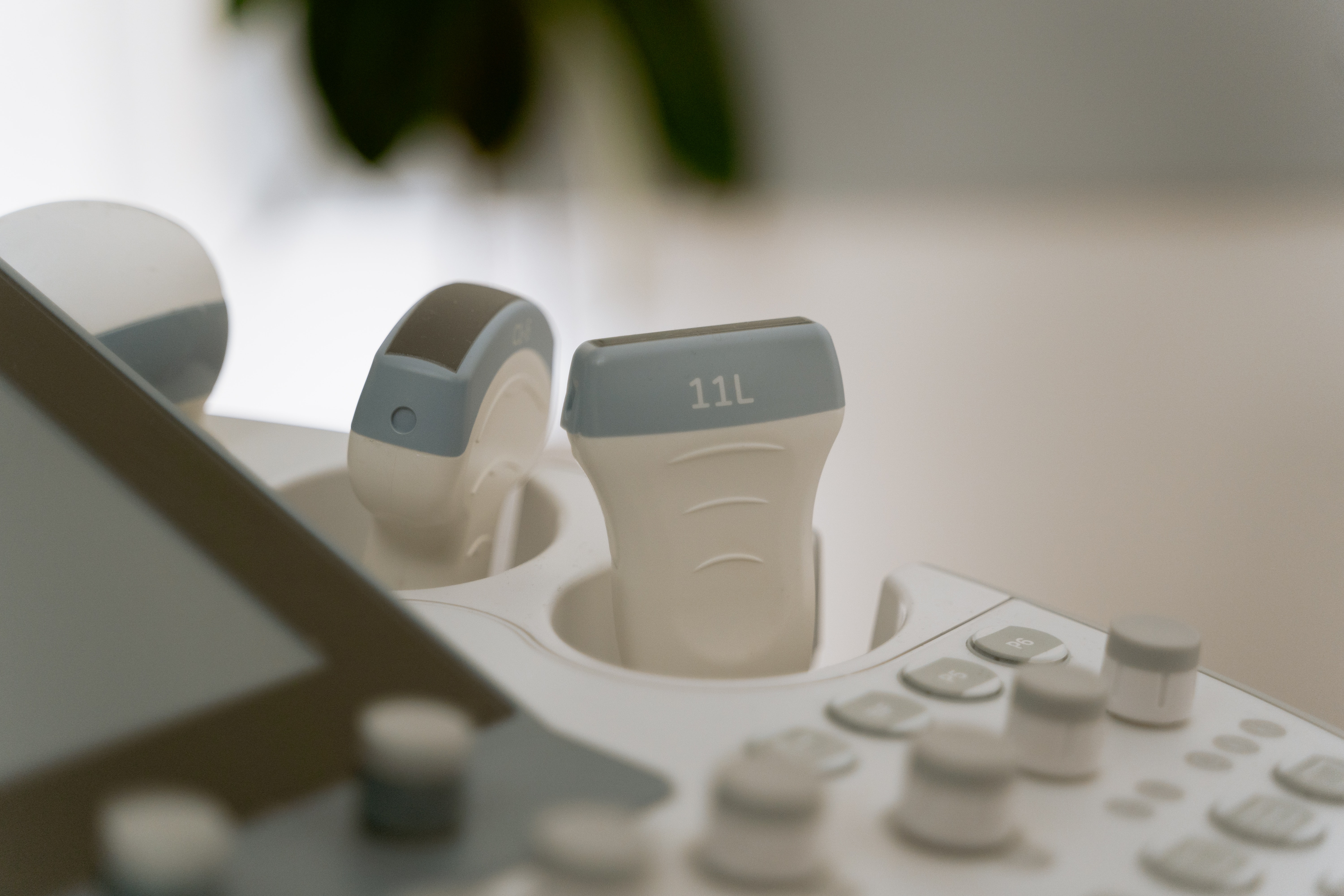Abdominal Ultrasound Scans
Abdominal ultrasound scans provide valuable insights into the overall health of the abdominal contents, which include the Liver, gallbladder, spleen, bile ducts, kidneys and pancreas.
Doppler ultrasound scans can also be used to assess the blood flow through the abdominal aorta, which is a key blood vessel that transports blood from your heart to the rest of your body.
If you’re suffering from abdominal pain or bloating, an ultrasound scan of the abdomen could help you to get the diagnosis you need.
What is an abdomen ultrasound scan?
The abdomen is the part of your body between your chest and your pelvis. It can also be called the belly or tummy. The abdominal cavity is a space that houses many important organs, blood vessels and other tissues. These include the liver, spleen, kidneys, abdominal aorta and gallbladder.
Abdominal ultrasound scans work by using high-frequency sound waves to create images. The sound waves bounce off the tissues of your abdomen to generate images of the internal organs and other structures. A scanning probe, also known as an ultrasound transducer, is moved over the skin with a lubricating ultrasound gel used, and emits these sound waves. The transducer then collects the echoes as they reflect off the abdominal contents. A computer uses this information to compile images on a screen in real-time.
Ultrasound waves cannot be heard by the human ear.
What does an abdominal ultrasound show?
An abdominal ultrasound will show the abdominal cavity and its contents, including abdominal organs, blood vessels and soft tissues.
Ultrasound scans enable images to be captured in real-time on a screen, and the images are usually in black and white, with different levels of shading based on the tissues being scanned.
What can ultrasound detect in the abdomen, or diagnose?
Abdominal ultrasound scans are useful imaging techniques for a range of diagnoses. These include:
-
Liver stones
-
Liver cancer
-
Liver disease
-
Pancreatitis
-
Enlarged organs
-
Abnormal fluid in the abdomen
-
Tumours and cysts
-
Hernias
-
Abscesses
-
Blood clots
-
Gallstones
-
Kidney stones
Can you see cancer in the abdomen with ultrasound?
Can ultrasound detect tumours? Abdomen scans using ultrasound can help determine what a lump is made up of. If it is fluid-filled, it is more likely to be a cyst, and the ultrasound echoes will differ between fluid-filled lumps and solid masses that may be tumours.
Ultrasound images of abdomen cancer usually wouldn't be used alone in diagnosis - an ultrasound scan of the abdomen would normally be followed up with further testing such as MRI or CT imaging or possible biopsy.
Is an ultrasound scan of abdomen safe?
Ultrasound scans have no known side effects, and are safe and non-invasive medical imaging procedures. There is no risk of radiation exposure, which differentiates ultrasound scans from CTs and X-rays, and it is also uncommon to use a contrast agent for an ultrasound scan compared to CT or MRI.
To find out more about ultrasound scans, you can visit our definitive guide.
How to prepare for an abdominal ultrasound examination
Abdominal ultrasound scans have more required preparations than other types of ultrasound. This is due to undigested food, and urine that hasn’t been passed, blocking some of the sound waves leading to reduced quality images.
If you're wondering 'can you drink water before an ultrasound of the abdomen?', the answer is usually no. You may well be asked to fast for 8-10 hours before your abdominal scan, and refrain from drinking. You should check with your doctor if you can continue to take your medication as normal.
We will always let you know what to do before ultrasound of the whole abdomen, and any necessary preparations in advance of your appointment.
Abdominal ultrasound: what to expect on the day
Ultrasound imaging is quick, simple and non-invasive. You can go about your day as normal after the scan, as ultrasound does not have any side effects.
On the day of your scan, you could expect the following steps to take place:
-
You might be asked to change out of your clothes and into a hospital gown. You’ll also need to remove any jewellery that might interfere with the scan procedure.
-
You’ll usually need to lie down on a flat couch for the scan, with your belly exposed.
-
The sonographer (scan technician) will apply a cool gel to the skin of your abdomen, to lubricate the area and prevent air bubbles from disrupting the scan images.
-
During the scan, the sonographer will move the transducer across your skin. If you are suffering with abdominal pain, you might experience some discomfort. You should tell your sonographer if you are experiencing pain during the procedure.
-
After the scan, you can resume your day as normal.
How long does an abdominal ultrasound take?
Abdominal ultrasound imaging is usually completed in less than than 30 minutes
How long do abdominal ultrasound results take?
After your abdominal ultrasound exam, a radiologist will study your ultrasound images, and write a report of their findings. This will be shared with our clinical team within 7 working days.
As soon as we receive your results, we will share the report with you by email, and our clinicians will provide a follow-up consultation to discuss the outcomes and next steps. If you need copies of your images for onward care, these can be provided on request.
How much does a private abdominal scan cost?
Our ultrasound scans start from £219, and this price includes a whole lot more than just your scan procedure. Book with us, and you’ll receive:
-
A pre-scan consultation with a dedicated expert clinician, to discuss your symptoms and requirements
-
Your choice of scanning centre, and a fast referral to your selected clinic
-
Your abdominal ultrasound scan
-
A radiologist’s report of your results
-
Access to your scan images upon request
-
A post-scan consultation with your clinician if any next steps are required
Next steps: How to book an abdomen ultrasound near me
-
Book a private ultrasound today without GP referral - our expert clinical team will take care of all the paperwork on your behalf. You can also choose from the UK's largest network of scanning locations with options near you.
-
Visit our news page to learn more about ultrasound scans and medical imaging
Sources used
Abdominal Ultrasound. (2019, November 19). Johns Hopkins Medicine. https://www.hopkinsmedicine.org/health/treatment-tests-and-therapies/abdominal-ultrasound
Abdominal ultrasound - Mayo Clinic. (2022, October 5). https://www.mayoclinic.org/tests-procedures/abdominal-ultrasound/about/pac-20392738
Can an Ultrasound Detect Cancer? (n.d.). Moffitt. https://www.moffitt.org/taking-care-of-your-health/taking-care-of-your-health-story-archive/can-an-ultrasound-detect-cancer/
Radiological Society of North America (RSNA) and American College of Radiology (ACR). (n.d.). Abdominal Ultrasound. Radiologyinfo.org. https://www.radiologyinfo.org/en/info/abdominus
The Healthline Editorial Team. (2018, September 17). Abdominal Ultrasound. Healthline. https://www.healthline.com/health/abdominal-ultrasound#procedure
WebMD Editorial Contributors. (2004, July 8). Abdominal pain: What you should know. WebMD. https://www.webmd.com/digestive-disorders/picture-of-the-abdomen

